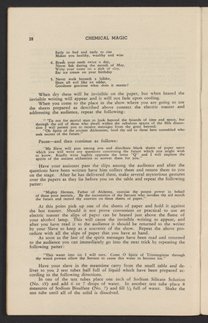Chemcraft Chemical Magic
95 Mystifying Magical Demonstrations
- 1940

Rights
Download all 32 images
PDFZIPof full-sized JPGsDownload selected image
Small JPG1200 x 1870px — 433 KBFull-sized JPG2145 x 3342px — 1.1 MBOriginal fileTIFF — 2145 x 3342px — 20.6 MBA manual written for middle to high school-age students to accompany the Chemcraft Chemical Magic Set. Includes 58 magic-themed experiments for the user to "amaze [their] friends by producing odors, invisible inks, and scores of other tricks which are equally mysterious. Complete directions are given for presenting a Chemcraft Magic Show including suggestions for stage settings, costumes, suitable 'patter' and publicity."
The instructions for performing a Chemcraft Magic Show direct the users to enact roles characterized by racist stereotypes, cultural appropriation, and blackface. The manual also uncritically suggests that users role-play enslavement. The work's illustrations include racist caricatures as well as a depiction of blackface.
| Property | Value |
|---|---|
| Publisher | |
| Place of publication | |
| Format | |
| Genre | |
| Extent |
|
| Language | |
| Subject | |
| Rights | No Known Copyright |
| Credit line |
|
Institutional location
| Department |
|---|
Related Items
Cite as
“Chemcraft Chemical Magic.” Hagerstown, Maryland: Porter Chemical Company, 1940. Science History Institute. Philadelphia. https://digital.sciencehistory.org/works/e7ft0h9.
This citation is automatically generated and may contain errors.
Rights
Download all 32 images
Searchable PDFmay contain errorsZIPof full-sized JPGsDownload selected image
-
Keyboard Shortcuts
Previous image shift + or , Next image shift + or . Pan image Zoom in + or shift + Zoom out - or shift + Zoom to fit 0 Close viewer esc Also
Mouse click to zoom in; shift-click to zoom out. Drag to pan. Pinch to zoom on touch.




































